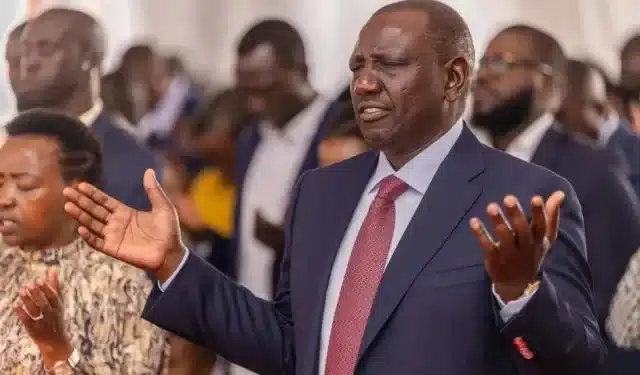Kenya’s political landscape between 2022 and 2024 has been marked by a stark reality: corruption continues to dominate governance, eroding public trust and undermining economic progress. Despite President William Ruto’s promise to fight graft and prioritize economic reform through his Bottom-Up Economic Transformation Agenda (BETA), his administration has faced allegations of mismanagement, political patronage, and high-profile corruption scandals.
This article draws from the comprehensive AfriCOG Report 2022-2024, Wrong Direction: Corruption in Kenya, to delve into the endemic corruption challenges in Kenya, with a focus on the controversial lease of Jomo Kenyatta International Airport (JKIA) to the Adani Group, the edible oil import scandal, and the broader implications for governance and public trust.
Corruption in Kenya is not new. Successive administrations, from Jomo Kenyatta to Uhuru Kenyatta, have grappled with—and often perpetuated—corrupt practices that undermine the rule of law and economic stability.

Corruption eating up Kenya’s revenue
The Ethics and Anti-Corruption Commission (EACC), despite a hefty budget of Ksh 3.5 billion, has failed to stem the tide. Between 2015 and 2020, reports from the Auditor-General showed that only 13% of government revenue was properly accounted for, with 20% of public funds stolen annually.
Also Read: KRA Fires 25 Employees Over Corruption, Recovers Ksh549M
President Ruto inherited a system riddled with these challenges. Although his campaign rhetoric promised a redistribution of resources and power from political dynasties to the “hustlers” at the grassroots, his administration has been accused of favoring political allies through a network of patronage.
One of the most contentious moments of Ruto’s presidency has been the proposed lease of Jomo Kenyatta International Airport (JKIA) to India’s Adani Group. Announced in March 2024, the $1.85 billion deal offered a 30-year concession for the airport’s management and modernization.
However, as documented in the AfriCOG Report, the deal quickly unraveled, revealing deeper issues of corruption, opacity, and disregard for public interest.
Documents leaked by whistleblower Nelson Amenya exposed key flaws in the agreement, including provisions allowing Adani to operate tax-free for ten years, import foreign labor at the expense of Kenyan workers, and defer major infrastructure improvements until 2054.
Additionally, the deal sought to ban the construction of competing airports within a 150-kilometer radius of Nairobi.
People’s Power
Public backlash was swift. The Gen Z-led #OccupyJKIA movement highlighted the lack of transparency, while unions called for strikes to oppose the privatization of a vital national asset. The controversy culminated in November 2024 when a New York court indicted Adani executives for fraud and bribery. Facing mounting pressure, President Ruto announced the cancellation of the deal during his State of the Nation address.
Despite the cancellation, the saga left a bitter taste. Analysts argue that the deal’s flaws were obvious from the start, but it took international legal action to force the administration’s hand. “This is a stark reminder of how vulnerable Kenya is to exploitation under opaque deals,” remarked a senior legal expert at the Law Society of Kenya.

KNTC Scandal
Another scandal highlighted in the AfriCOG Report was the questionable revival of the Kenya National Trading Corporation (KNTC) to manage price stabilization for essential goods. Approved during the administration’s first cabinet meeting, the KNTC oversaw the importation of 125,000 tons of duty-free cooking oil.
However, instead of stabilizing prices, the program turned into a fiasco. Billions of taxpayer funds were lost when politically connected firms were awarded exclusive contracts to import the oil.
Also Read: IMF Bosses Ask Kenya to Request a Corruption & Governance Review
By mid-2024, much of the stock sat unsold in warehouses or remained uncleared at the port. Senate investigations revealed that three companies—Multi Commerce FZC, Charma Holdings, and Shehena Commodity—received payments totaling $85 million, despite failing to deliver the intended public benefit.
The public outcry was fueled by the waste of public funds and the clear favoritism shown to firms with ties to high-ranking officials. “This was not about helping ordinary Kenyans—it was about enriching a few at the expense of many,” noted a representative from the Kenya Human Rights Commission.
Politics is to blame too
Furthermore, the AfriCOG Report emphasizes that Kenya’s corruption problem stems from its patronage-driven politics. Successive governments have relied on rewarding political allies and suppressing opposition through access to state resources.
President Ruto has followed this well-trodden path, using appointments and contracts to consolidate power.
Critics point to his controversial appointments of individuals facing criminal investigations into key positions. For instance, over 50 Chief Administrative Secretaries (CAS) were appointed despite a court ruling that the positions were unconstitutional.
Similarly, lucrative government contracts, like those awarded to Adani Group for electricity grid projects, bypassed competitive bidding processes, further entrenching the culture of impunity.
This approach has left key institutions like the EACC, Auditor-General’s office, and judiciary weakened.
Whistleblowers and investigative journalists who attempt to expose corruption face threats and lawsuits, creating a chilling effect on accountability.
Hopeless Nation
Kenyans are increasingly disillusioned with their leaders. Polls cited in the AfriCOG Report show that by late 2024, 73% of citizens believed the country was headed in the wrong direction. Protests led by the Gen Z movement have become a potent symbol of public frustration, as young people demand accountability and reforms.
The government’s response to dissent has been heavy-handed. Protesters have faced police brutality, while media outlets critical of the administration have seen their advertising revenues slashed.
Civic groups and NGOs have also been pressured to align their agendas with government priorities, further limiting the space for dissent.
What next?
Kenya’s battle against corruption is far from over. Experts, including those contributing to the AfriCOG Report, suggest that lasting change will require:
Strengthening Institutions: Anti-corruption agencies must be given the independence and resources to operate without political interference.
Transparent Governance: Competitive bidding processes and public participation should be mandatory for all major contracts.
Empowering Civil Society: Whistleblowers, investigative journalists, and civic organizations must be protected and supported to hold leaders accountable.
Ending Political Patronage: A merit-based system for appointments and resource allocation is crucial to breaking the cycle of impunity.
President Ruto has an opportunity to set a new course for Kenya. However, this will require more than rhetoric—it will demand bold, decisive action to dismantle the structures that enable corruption.
The AfriCOG Report paints a sobering picture of Kenya’s fight against corruption. The scandals and challenges of the past two years underscore the urgent need for governance reform. As the nation grapples with economic instability and public discontent, the stakes have never been higher.
For Kenya to move forward, its leaders must prioritize integrity over expediency, placing the nation’s interests above personal or political gain.
Only then can the country realize its immense potential and build a future free from the shackles of corruption.
Follow our WhatsApp Channel and join our WhatsApp Group for real-time news updates.











































































